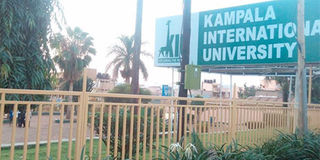KIU teaching 13 illegal courses

Kampala International University
What you need to know:
- Quoting the Universities and Other Tertiary Institutions Act, Mr Waigolo said students who graduated or are currently enrolled on such unaccredited courses in any institution of higher learning will carry useless certificates.
- Dr Kasimbazi yesterday said the courses, which need accreditation, are only those in the School of Engineering, which NCHE had previously given a blanket accreditation but it expired in 2016.
Kampala International University is teaching 13 unaccredited courses which are not recognised by the National Council for Higher Education (NCHE).
In essence, the courses are illegal and the academic certificates awarded to the graduates are unrecognised for employment and further studies.
Some of the students pursuing the contested courses held demonstrations at the university campus in Kansanga, a Kampala suburb, last week demanding explanations from the administration.
Dr Annet Kezaabu Kasimbazi, the deputy vice chancellor for academics, said they had been in talks with students to explain their efforts to have the courses accredited but were shocked to see them demonstrating.
“We are in the process of having these courses accredited. The students were misinformed. We have alumni from engineering courses who are already working. We have never had any issues. We are in the process of accrediting a few of the remaining courses in engineering and it is not a one-day process,” she said.
Sources at NCHE said KIU submitted 54 courses on October 30 last year to the regulatory body for consideration. However, on February 2, NCHE wrote to KIU informing them that the courses fell short of the minimum standards and the university received the letter on March 5.
KIU speaks out
However, Dr Kasimbazi yesterday said the courses, which need accreditation, are only those in the School of Engineering, which NCHE had previously given a blanket accreditation but it expired in 2016.
She explained that the other courses submitted to NCHE were those which had already been accredited but required to be reviewed after five years.
“I understand there was a gap. They (NCHE) said we must go and revise them and come back for proper inspection. This was not done and that blanket accreditation expired in 2016,” Dr Kasimbazi said.
“We should have run immediately to have these courses accredited but we had several other things we were focusing on such as ensuring the PhD programmes were secured,” she added.
She said the revised reports on the contested courses will be submitted to NCHE today for inspection and seek to be granted three months to ensure the laboratories are equipped as required.
Mr Saul Waigolo, the NCHE spokesperson, yesterday confirmed receipt of KIU’s courses for accreditation.
“We made a review of the 54 courses KIU submitted in collaboration with the professional bodies but we found out that some information was lacking. We told them to go and do some corrections. Some of the submissions required major corrections while others needed minor corrections. Since then, we have not heard from KIU,” Mr Waigolo said in an interview.
Cost of verification
Sources at KIU say NCHE’s cost of verification of the submitted courses was prohibitive. They said for the 54 courses submitted for accreditation, NCHE wants Shs55m.
However, Mr Waigolo justified the cost, saying NCHE hires experts and pays their transport costs and allowances to verify the information.
He said it takes at least six months to accredit a programme and wondered why it had taken KIU this long and graduated students on unaccredited courses.
Quoting the Universities and Other Tertiary Institutions Act, Mr Waigolo said students who graduated or are currently enrolled on such unaccredited courses in any institution of higher learning will carry useless certificates.
He advised the affected students to negotiate with the university management so that they are readmitted to the accredited courses or wait to have those courses accredited first.




